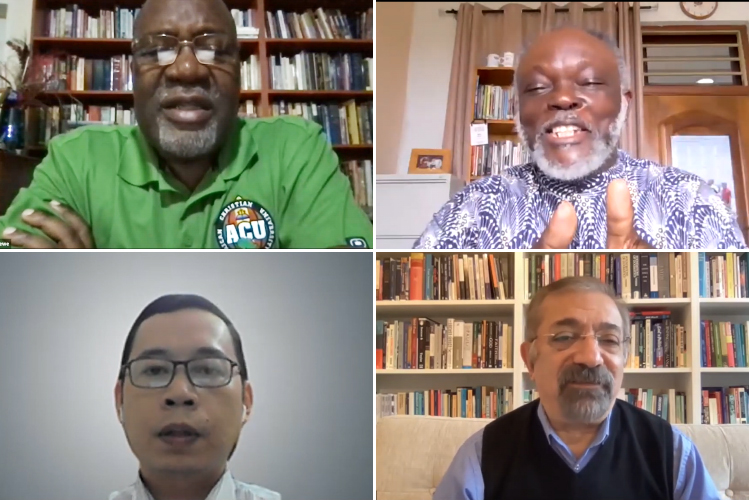Christian leaders shared the situation of false gospels in their countries and how to share the true gospel effectively in a world full of fake news.
The third and final webinar “Telling the Story”, in the series “The Good News in a World of Fake News”, was held by the Lausanne Theology Working Group on November 19, 2021.
Following the previous two webinars “Knowing the Story” and “Being Shaped by the Story”, this webinar switched the focus to the communication process where the gospel goes into the field.
The webinar was led by Conrad Mbewe, pastor of Kabwata Baptist Church in Zambia. Three panelists with backgrounds in Iran, Vietnam, Ghana, and Nigeria contributed their insights on why fake gospels were so prevalent and how true gospel could prevail.
The discussion started with a video where three other Christian leaders shared about the challenges brought about by fake gospels in their countries.
George Makeen from Egypt mentioned two opposite trends in his homeland: some churches tended to stress that Christians would all go through persecutions, even to the point that believers could not understand how they could be equal citizens; on the other hand, there was the gospel that God would always miraculously keep His people out of harm’s way. Nara Bayadaa from Mongolia spoke about the disproportional emphasis on seeking economical and physical help from Jesus in Mongolian churches. While Aogu Suzuki shared that in Japan, evangelism was challenged by the notion that Japanese culture had nothing to do with the Christian church, which led to a disconnection between churches and communities.
The panelists also provided insights based on their backgrounds. Femi B. Adeleye, director of Langham Preaching Africa, who has served in Ghana and Nigeria, observed an impressive effort in preaching the gospel in Ghana, yet he also found a widely spread “vending machine” - like gospel that stressed meeting personal needs. Nevertheless, Christian leaders and preachers have realized that there is a need for training to ensure that a sound gospel is being preached.
Mehrdad Fatehi, founder and president of Pars Theological Center, who has served in both Iran and the UK pointed out that the Iranian church while growing very fast, saw “reductionistic versions” of the gospel circulating on social media. The other challenge was that Christianity was identified as a part of the Western culture among Iranians, and it could be hard for new Christians to distinguish what is Biblical and what is simply Western.
Nam Vo, youth leader at the Evangelical Church of Vietnam shared that Vietnamese Christians had generally remained faithful to God’s word through the years of hardship, yet in the new age of technology, he saw both the risks of social media and big potential in being creative to share the gospel outside of the church walls.
After sharing the status quo, the panelists discussed the reasons that fake gospels were so loud and what some of the deficiencies are in the current teaching of the gospel.
“Fake news thrives on ‘shortcuts’,” said Adeleye. “Sadly, some churches have adopted the shortcuts: reducing the gospel to be ‘user-friendly’, (preaching) what attracts the crowds.” He shared that in Africa, a common preaching emphasis was “going to heaven” and the living out the faith part could be neglected. “The Scripture speaks to all spheres of life... we need to equip people to diligently study the Scripture enough to proclaim the holistic gospel that does not become so user-friendly as to reduce the gospel to what it is not.”
Fatehi, who works to train Iranian Christian leaders, agreed with Adeleye, “one of the reasons that the fake news become so attractive is that often we don’t teach and preach the full gospel message. We tend to reduce it to one or two elements.” He added, “Many of the distorted gospels are actually one dimension or reaction that is taken to the extreme,” explained Fatehi, “they take neglected or under-emphasized truth and over-emphasize it.”
As the panelists moved on to the how-tos, Nam, the youth worker in Vietnam shared advice on approaching youths. “For youth ministry, it’s important to understand youth culture and preaching the gospel in a way that is relevant to young people’s life. It’s not that youths nowadays shut themselves from the gospel, but we need to find a way to share the gospel courageously, creatively, and more relevant.”
From the perspective of the church, Nam argued that in order for the true gospel to spread and prevail, the church ought to provide discipleship and become a place where Christians encounter Jesus and are transformed by the gospel. “The church needs to provide a community of care and at the same time provide sound doctrines.”
Fatehi agreed with Nam on the importance of relevant preaching. “One of the reasons why people resorted to forms of distorted gospels is that we preach irrelevantly sometimes.” He stressed that it was important to be faithful, yet it was equally important to address the issues that were impacting the listeners’ lives and teach how to apply the gospel. “I don’t mean these needs should drive the message. We need to be context-critical, not context-driven.”
On the other hand, he suggested that church members should try not to alienate those who believe a distorted gospel or stress one dimension of the gospel but take a loving and inclusive approach.
Adeleye stressed that all believers needed to be equipped with a good understanding of the full gospel. He recommended home cell groups, which have been adapted in many churches, where members could not only study the Bible together but also ask questions about the sermon that they did not get to ask during the Sunday service. As a director of a preaching training organization, he emphasized that preachers needed to be trained properly to understand what the Scripture really means; particularly, they shouldn’t expect to preach merely with the help of the Holy Spirit.
The Lausanne Movement is a Christian organization that "connects influencers and ideas for global mission, with a vision of the gospel for every person, disciple-making churches for every people and place, Christ-like leaders for every church and sector, and kingdom impact in every sphere of society".












